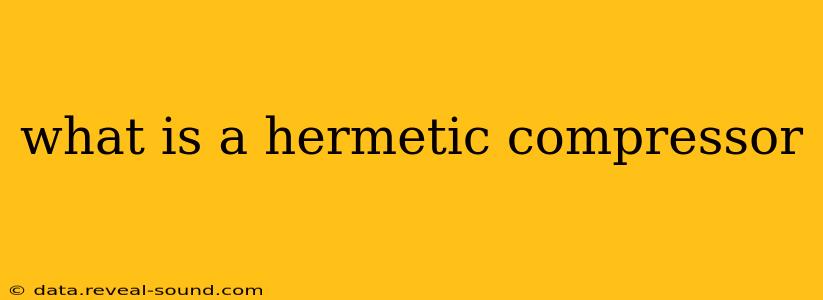A hermetic compressor is a type of compressor where the motor and compressor are housed within a single, sealed casing, filled with refrigerant. Unlike open compressors, there's no direct connection between the motor and the outside environment. This unique design offers several advantages and is crucial in many refrigeration and air conditioning applications. Let's explore this technology in detail.
How Does a Hermetic Compressor Work?
The heart of a hermetic compressor is its sealed casing. This casing prevents refrigerant from leaking out and keeps the motor from being exposed to moisture or contaminants. The motor itself is usually an electric motor, directly connected to the compressor mechanism. When the motor runs, it drives the compressor, which compresses the refrigerant vapor. This high-pressure vapor then travels to the condenser, where it releases heat and converts back into a liquid.
The entire process, from vapor compression to condensation, occurs within the sealed system. This sealed environment is what distinguishes a hermetic compressor from other types, providing significant benefits in terms of efficiency and reliability.
What are the Advantages of Hermetic Compressors?
Several key advantages make hermetic compressors a popular choice in refrigeration and air conditioning systems:
- High Efficiency: The sealed system minimizes refrigerant loss, leading to improved energy efficiency. The absence of external seals and bearings also reduces friction and improves overall efficiency.
- Improved Reliability: The enclosed nature of the unit protects the motor and compressor from environmental factors, reducing the risk of damage from moisture, dust, or other contaminants. This leads to a longer lifespan.
- Compact Design: The integrated design allows for a more compact unit, saving valuable space in installations.
- Reduced Noise: The sealed casing effectively dampens the noise produced by the compressor and motor, making it quieter than open compressors.
- Lower Maintenance: Because the system is sealed, there's less need for regular maintenance compared to open compressors. Lubrication is often handled internally.
What are the Disadvantages of Hermetic Compressors?
While hermetic compressors offer numerous advantages, there are some drawbacks to consider:
- Repair Costs: If the motor or compressor fails, the entire unit needs to be replaced, which can be expensive. Repairing a hermetic compressor is often not feasible due to the sealed nature of the system.
- Limited Control: Precise control over the compressor's operation can be more challenging compared to open types.
- Potential for Overheating: In some cases, the sealed environment can contribute to overheating if proper ventilation is not provided.
What are Some Common Applications of Hermetic Compressors?
Hermetic compressors are widely used in various applications, including:
- Household Refrigerators and Freezers: Most household refrigerators and freezers rely on hermetic compressors for their efficient and quiet operation.
- Air Conditioning Systems: Hermetic compressors are commonly used in both residential and commercial air conditioning units.
- Water Coolers: Many water coolers utilize hermetic compressors to maintain cold water temperatures.
- Industrial Refrigeration Systems: While larger industrial systems may use other types of compressors, hermetic units find application in various industrial refrigeration needs.
What is the Difference Between a Hermetic and Semi-Hermetic Compressor?
A semi-hermetic compressor is similar to a hermetic one, but it features a connection point for servicing or maintenance. This access allows for easier repair or replacement of components, unlike a fully hermetic unit that typically requires complete unit replacement upon failure. Essentially, semi-hermetic units offer a compromise between the benefits of hermetic sealing and easier serviceability.
How Long Do Hermetic Compressors Last?
The lifespan of a hermetic compressor depends on various factors, including the quality of the unit, the operating conditions, and the frequency of use. However, many hermetic compressors can last for 10 years or more with proper maintenance and care.
This comprehensive look at hermetic compressors should provide a better understanding of their design, advantages, disadvantages, applications, and longevity. Remember, always consult with a qualified technician for any refrigeration or air conditioning system repairs or maintenance.
